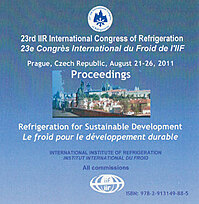
Summary
Gas-liquid coupling oscillation is a novel way to reduce resonant frequency and to elevate pressure amplitude of a thermoacoustic engine, which could be attributed to the increased acoustic inertance by introducing a liquid column into the resonant tube. The performance of a thermoacoustic engine with gas-liquid coupling oscillation could be largely affected by the density and viscosity of liquid, since the acoustic inertance of liquid column is proportional to the liquid density, and the viscous dissipation of liquid column is one of main acoustic power losses in such a system. This paper focuses on the impact of the density and viscosity of liquid on the engine’s performance, i.e., the resonant frequency, pressure amplitude, and hot end temperature of the stack, by numerical simulation. Ambient temperature ionic liquid [EMIM][BF4] and water are respectively chosen as the liquid column in the experiments to validate the simulation.
Available documents
Format PDF
Pages: 6 p.
Available
Public price
20 €
Member price*
Free
* Best rate depending on membership category (see the detailed benefits of individual and corporate memberships).
Details
- Original title: Impact of liquid density and viscosity on the performance of a thermoacoustic engine with gas-liquid coupling oscillation.
- Record ID : 30001627
- Languages: English
- Source: Proceedings of the 23rd IIR International Congress of Refrigeration: Prague, Czech Republic, August 21-26, 2011. Overarching theme: Refrigeration for Sustainable Development.
- Publication date: 2011/08/21
Links
See other articles from the proceedings (569)
See the conference proceedings
-
Resonance conditions of the air column in a the...
- Author(s) : ALIPPI C., D’ORAZIO A., COPPI M., et al.
- Date : 2013/06/16
- Languages : English
- Source: Clima 2013. 11th REHVA World Congress and 8th International Conference on Indoor Air Quality, Ventilation and Energy Conservation in Buildings.
- Formats : PDF
View record
-
Vapor pressure measurement of liquid dessicants...
- Author(s) : ZHENG S., HE Y., FU J., et al.
- Date : 2018/06/18
- Languages : English
- Source: 13th IIR Gustav Lorentzen Conference on Natural Refrigerants (GL2018). Proceedings. Valencia, Spain, June 18-20th 2018.
- Formats : PDF
View record
-
Evaluation of thermoacoustic cycles for cooling...
- Author(s) : PAEK I., BRAUN J. E., MONGEAU L.
- Date : 2006/07/17
- Languages : English
- Source: 2006 Purdue Conferences. 18th International Compressor Engineering Conference at Purdue & 11th International Refrigeration and Air-Conditioning Conference at Purdue [CD-ROM].
- Formats : PDF
View record
-
Design and experimentation for thermodynamic an...
- Author(s) : WANKHEDE U. S.
- Date : 2006/05/21
- Languages : English
- Source: ACRA-2006. Proceedings of the 3rd Asian conference on refrigeration and air conditioning.
View record
-
CFD study of oscillatory flow through 90° bends...
- Author(s) : ILORI O. M., MAO X., JAWORSKI A. J.
- Date : 2015/08/16
- Languages : English
- Source: Proceedings of the 24th IIR International Congress of Refrigeration: Yokohama, Japan, August 16-22, 2015.
- Formats : PDF
View record
